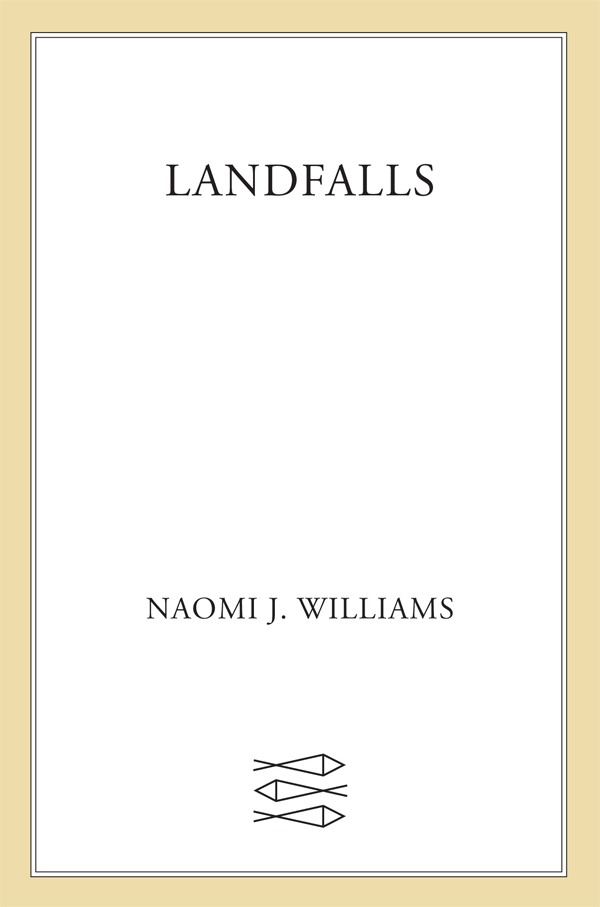
Landfalls
A Novel
- اطلاعات
- نقد و بررسی
- دیدگاه کاربران
نقد و بررسی

June 22, 2015
Williams’s debut novel is a historical maritime adventure based on the actual ill-fated 1785–1788 Lapérouse expedition of scientific exploration, when France sent two ships on an around-the-world voyage of discovery. Williams’s research is thorough and meticulous, using primary sources such as letters, journals, and reports sent from the expedition—until both ships and their crews vanished without a trace in 1788 in the South Pacific. From those sources Williams weaves a fictional and suspenseful tale of uncertain exploration, telling each part of the story from a different character’s perspective and location. In London, the expedition’s naval engineer tries to buy British navigation and scientific instruments without tipping off the English to their use. In Chile, the French are greeted warmly by the Spanish, but illicit romance and ideas of imperialism and revolution surface. Alaska sees tragic contact with local natives, and a visit to California reveals the threat of Russian expansion. In Macao, the expedition commander, Captain Jean-Francois Lapérouse, has trouble with the pompous scientists. In the South Pacific, the ships battle islanders, suspicions of murder arise, and the ships and crews disappear. Years later, search parties and blind luck reveal clues to the fate of the Lapérouse expedition, and Williams brilliantly describes the end of the expedition as remembered by a single survivor and several islanders. Williams does a masterly job with her descriptions of the officers, sailors, scientists, and people they meet, explaining a colorful, vibrant bit of maritime history in the age of discovery.

Starred review from June 1, 2015
Williams makes an entertainingly erudite debut with a prismatic reimagining of the doomed French attempt to circumnavigate the globe in the 1780s. With their "scientific mission paramount, no reasonable expense to be spared," captains Jean-Francois de Galaup de Laperouse and Paul-Antoine-Marie Fleuriot, Viscount de Langle, set sail in 1785 aboard the Boussole and the Astrolabe. As the "savants" onboard-geologists, physicists, botanists-prepare to study the exotic, Williams' narrative focuses on the human. Especially poignant is her illustration of how native cultures are poorly interpreted by European explorers celebrating the virtues of Enlightenment. From overweening functionaries and pretentious colonialists, captains and savants are soon forced to decipher personalities and politics. First at Concepcion in Chile, where Governor General Ambrosio O'Higgins seeks peace with the Arauca; then Alaska, where they're perceived as "Snow Men...in winged war canoes" by bemused Alaska Natives; next Monterey in Alta, California, that visit rendered from the points of view of the governor's wife, mission priests, and others; next Macao, opium and disobedience; followed by Petropavlovsk in far eastern Russia. There, translator Barthelemy de Lesseps leaves to carry expedition reports to Paris across frozen Siberia by way of St. Petersburg. Finally, in the Navigator Islands, the captains face massacre and then shipwreck. Page upon page reveal characters like the scientist Lamanon, "a genius, he has no time for manners," unmourned after being killed by rock-pelting South Sea islanders; and the conscientious Capt. Laperouse, whose cabin is decorated with busts of Rousseau and Capt. Cook. Amid the seesawing boredom and terror of days at sea, William crafts an elegant and entrancing narrative to match her dissection of the landfalls. A moving epilogue concludes the narrative with de Lesseps identifying wreckage discovered on Vanikoro, knowing that "the globe we had tried so hard to complete [had swallowed] us whole." Literary art of the first order, intelligent and evocative in the way of the best of historical fiction.
COPYRIGHT(2015) Kirkus Reviews, ALL RIGHTS RESERVED.

Starred review from April 15, 2015
Tracing the movements of France's ill-fated Laperouse maritime expedition in the late eighteenth century, Williams' exceptional debut isn't your traditional seafaring yarn and is all the stronger and more penetrating for it. The plot moves confidently between views of the changing landscapefrom a crisply evoked Georgian London, where a naval engineer travels to procure supplies, and then on to Tenerife, Chile, Alaska, California, Russia, and the South Seas islandsand its characters' choices and inner lives. The emphasis is not on fast-paced drama so much as on interactions among the two ship's captains (Laperouse and Langle), their crews, the numerous scientists on board, and the residents and natives at many stopping points. Williams' status as an acclaimed short story writer is evident in her craftsmanship of each perfectly encapsulated chapter, each recounted from a different viewpoint or viewpoints. The section set at Monterey in 1786, for instance, demonstrates masterful use of perspective, as one revelation after another about the Spanish mission there comes to light. Full of period sensibilities, particularly the Enlightenment-era urge to go forth and explore new domains, the novel is alternately charming, invigorating, and heartbreaking, and always thoughtful and humane. Even readers who don't seek out nautical adventures will find themselves drawn in, especially if they love high-quality literary fiction.(Reprinted with permission of Booklist, copyright 2015, American Library Association.)




دیدگاه کاربران